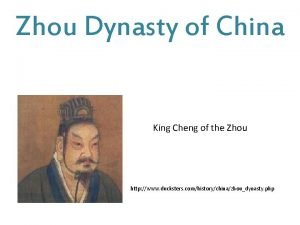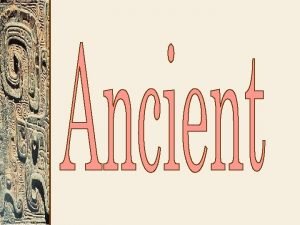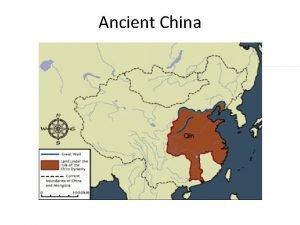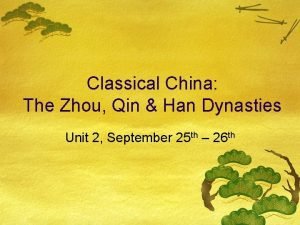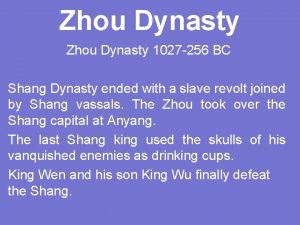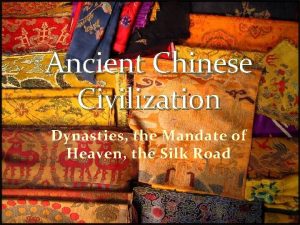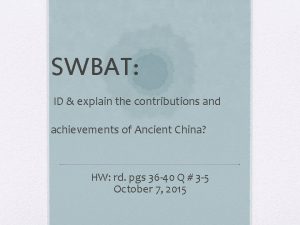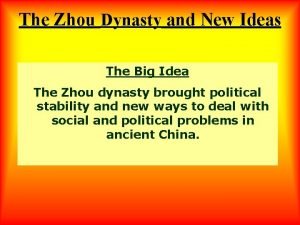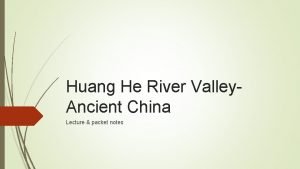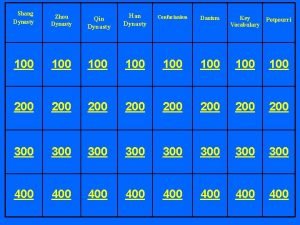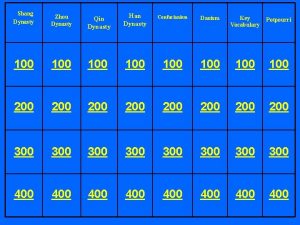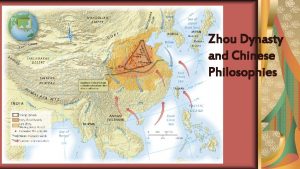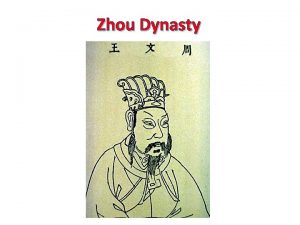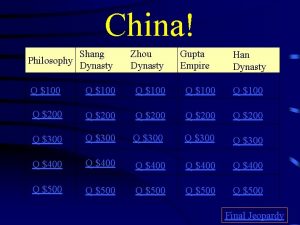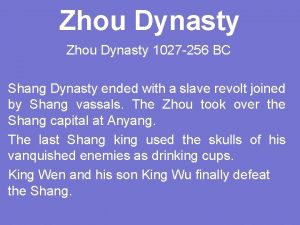Zhou Dynasty of China King Cheng of the









- Slides: 9

Zhou Dynasty of China King Cheng of the Zhou http: //www. ducksters. com/history/china/zhou_dynasty. php

§ established by Wuwang, whose father Wenwang wanted to take over the Shang Dynasty because of its cruel leader § they took over, convincing the people that they had the Mandate of Heaven, which was a law or order from heaven supporting the new ruler § some people did rebel against the Zhou and battles took place for 3 years before the Shang were overthrown § Wuwang made Haojing the new capital § this was the longest dynasty in Chinese history § divided into 2 time periods: * XI (Western Zhou): 11 th century B. C. – 771 B. C. * Dong (Eastern Zhou): ** Spring and Autumn Periods (770 B. C. – 476 B. C. ) ** Warring States Period (476 B. C. – 221 B. C. )

Accomplishments § cast iron was invented during this period, which was used for tools and weapons § the Zhou are most famous for their work with bronze § they invented crop rotation, which allowed for more efficient use of the land § soybean was added as a major crop § the language known as “Old Chinese” was spoken by most people

Chinese Philosophies Confucianism: * started by Confucius, or Kong Fu Zi (Master Kong), who was born in 551 B. C * he is believed to be China’s first professional teacher and charged students a fee to take classes * his teachings were based on “ren”, or loving others * he believed in the Golden Rule: “What you do not wish for yourself, do not do to others” * he believed a leader should set a moral example for his people by treating them with compassion and showing good manners * he published many books and is considered to be one of the most influential teachers in Chinese history

Quotes from Confucius “I hear and I forget. I see and I remember. I do and I understand. ” “Our greatest glory is not in never falling, but in getting up every time we do. ” “Respect yourself and others will respect you. ” “When anger rises, think of the consequences. ” “Before you embark on a journey of revenge, dig two graves. ” “The superior man is modest in his speech, but exceeds in his actions. ” “Life is really simple, but we insist on making it complicated. ” “Choose a job you love, and you will never have to work a day in your life. ”

Taoism: * started in 550 B. C. by Lao-tzu * primary belief is in learning and practicing “The Way” (Dao) which is the ultimate truth to the universe * recognize many gods and goddesses * symbolized by the Yin-Yang * nature is balanced , there are no extremes (no total good or evil, no complete positives or negatives) * they believe that worry causes stress on the body, so we need to achieve peace and tranquility * Taoism teaches that sickness is caused by sin and we should focus on Three Treasures: be charitable, be thrifty, and do not push ahead of others * they believe that we should strive to be “average” and refuse wealth and power * believe that very influential members of Taoism are transformed into immortals who help others * today, there are 20 million followers of Taoism * basic concepts of tai-chi come from Tao teachings

Quotes from Lao-Tzu “Being deeply loved by someone gives you strength, while loving someone deeply gives you courage. ” “If you do not change direction, you may end up where you are heading. ” “The journey of a thousand miles begins with one step. ” “He who knows, does not speak. He who speaks, does not know. ” “Respond intelligently even to unintelligent treatment. ” “Great acts are made up of small deeds. ” “He who talks more is sooner exhausted. ”

• Spring and Autumn Periods: * the area was broken into feudal states, each ruled by nobles, who ran the lands how they wanted * the nobles “owned” the farmers who worked their lands * by the end of this period, many of the nobles had conquered each other and there were only seven main states left • Warring States Period * the last seven states fought each other until there was only one left * Qin Shi Huang, leader of the Qin state, took over and united all the states * he crowned himself emperor of a united China, which ended the Zhou Dynasty

Social Class Structure in Feudal States
